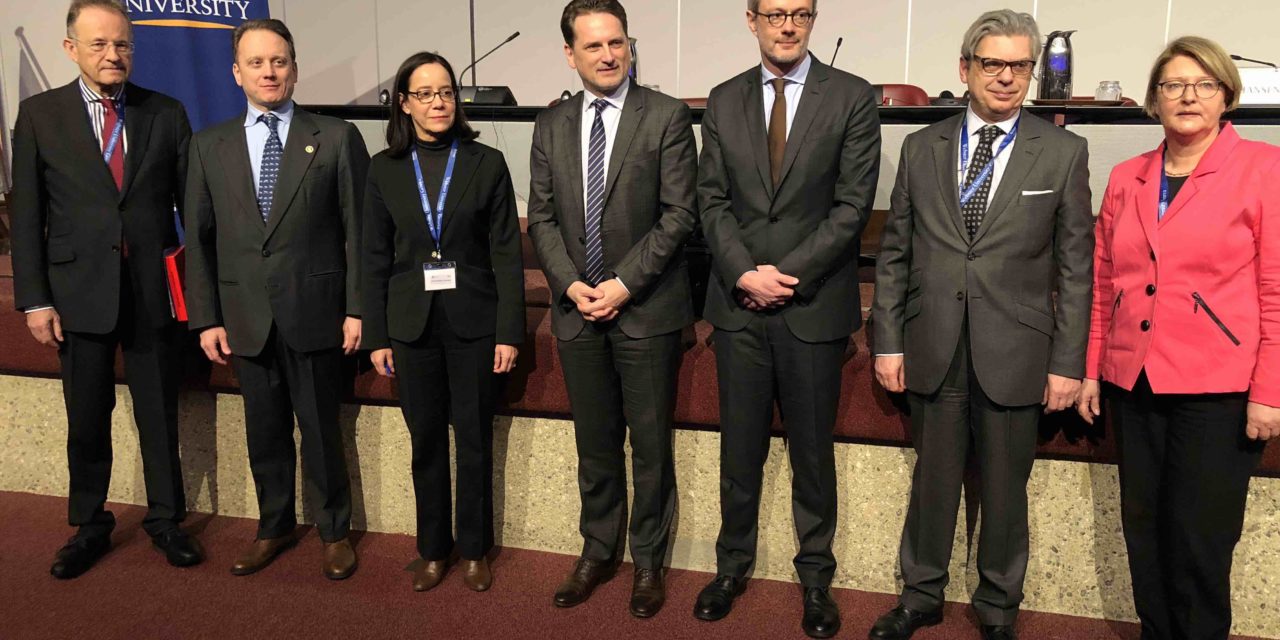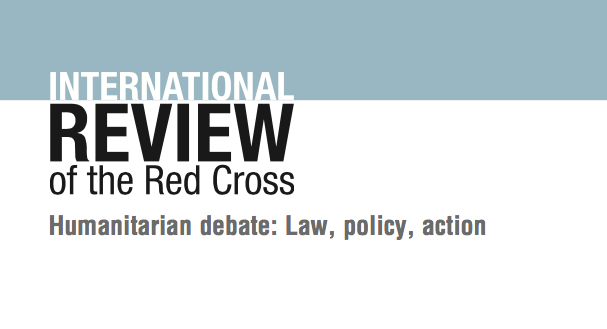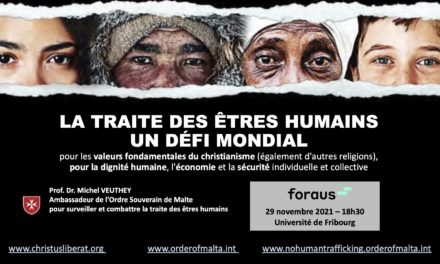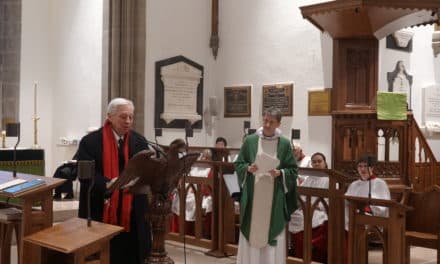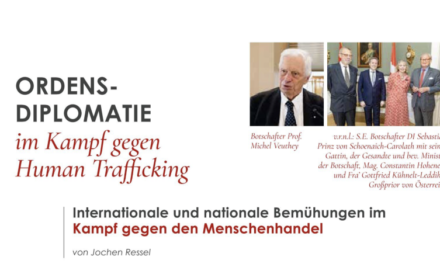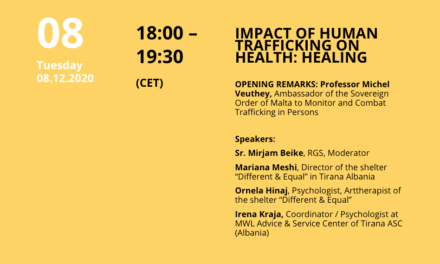SEE THE TEXT OF PROFESSOR MICHEL VEUTHEY’S PRESENTATION BELOW.
The 23rd International Humanitarian and Security Conference, presented by Webster University Geneva took place on February 15–16, 2018, at the International Conference Center Geneva with the theme of THE NEED FOR EFFECTIVE GLOBAL COMPACTS ON REFUGEES AND MIGRATION.
The acute world-wide crisis of refugees, internally displaced people and of migrants driven by economic factors represents one of the most important humanitarian and political challenges for individual countries and for the international community as a whole. There is a broad consensus that beside emergency relief and protection there is a need for a long-term strengthening of the international refugee regime and for a more effective and humane approach to labor migration.
It is the recognition of these needs that is at the origin of the process, launched in the fall of 2016, of defining two closely related but still distinct “global compacts,” one on refugees and the other on migration, to be adopted by the members of the United Nations before the end of 2018.
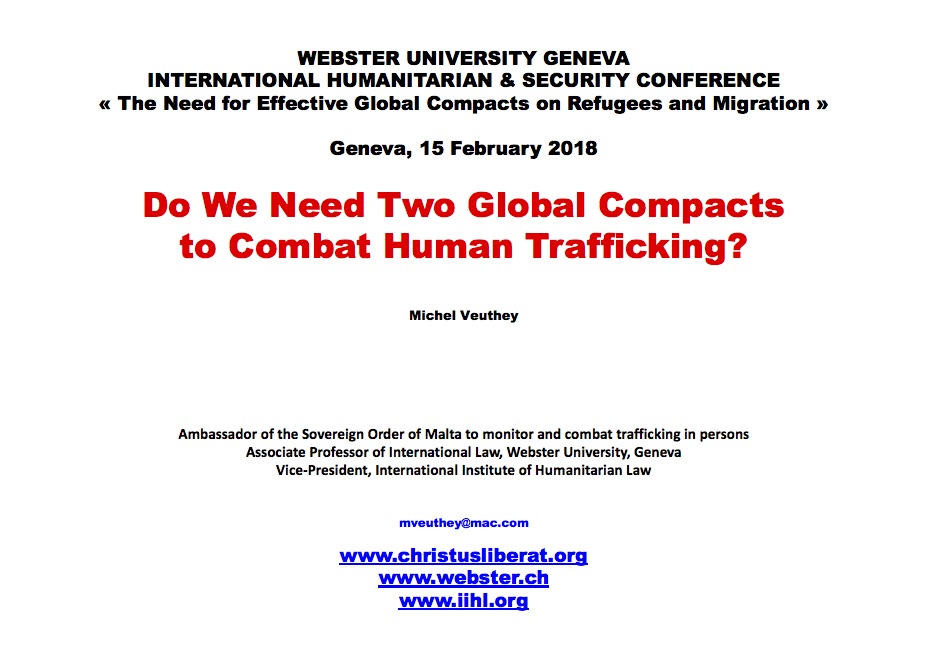
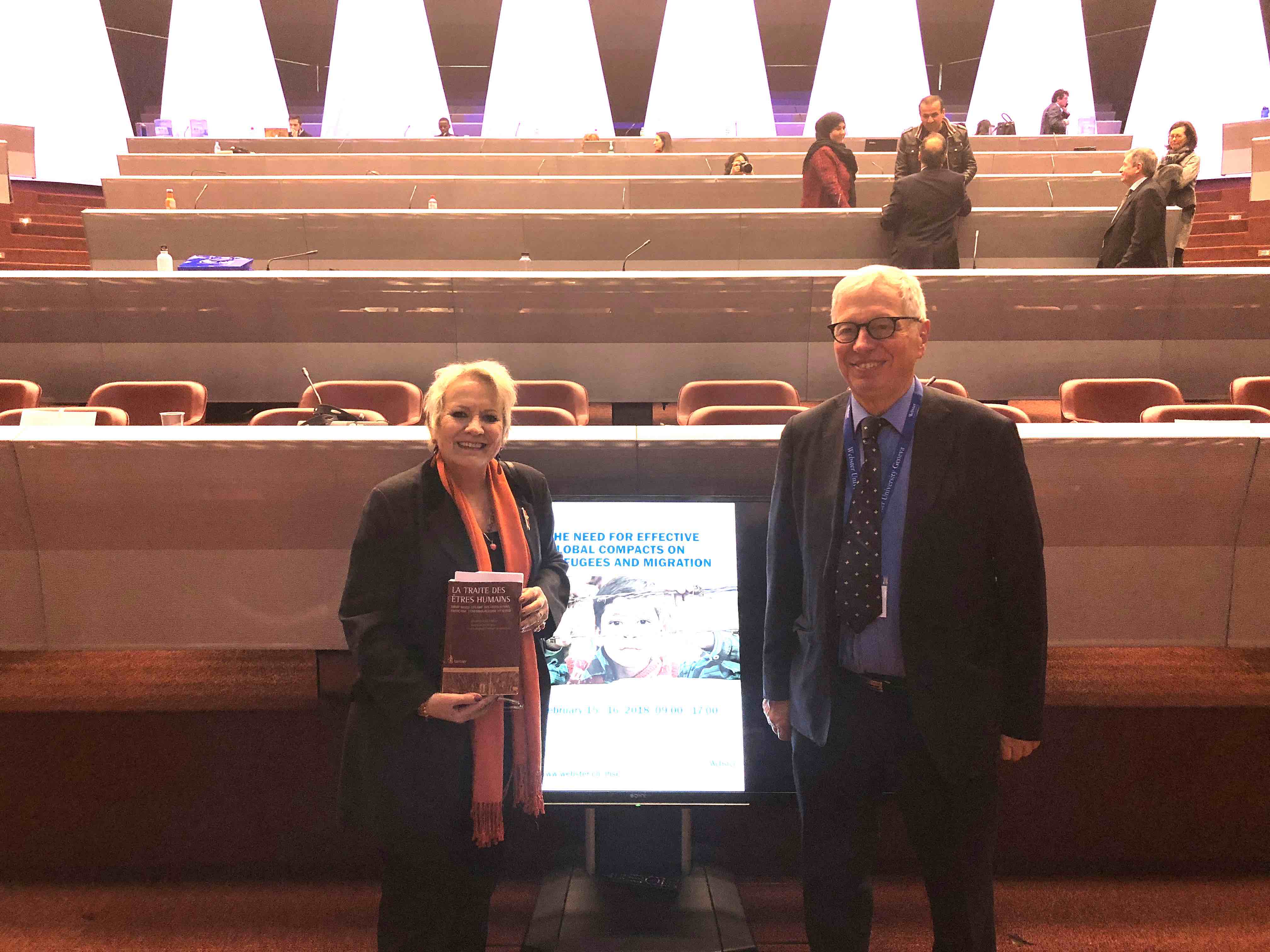
WEBSTER 15 FEBRUARY 2018
HUMAN TRAFFICKING
Thank you to the organizers for choosing this topical theme, important in both humanitarian action, humanitarian diplomacy in Geneva and New York, and also in the heart of passionate political debates.
I will not talk about migration in general, nor about refugees and migrants in particular, but about a category of people reduced to desperate situations, deprived of almost all their rights as victims of human trafficking.
Trafficking in human beings is too often misunderstood, in its extent and even in its existence. And yet this form of modern slavery is a scourge that today affects tens of millions of people around the world, in all countries, whether in the form of forced labor, forced prostitution or organ harvesting.
And the issue of this resurgence of slavery and torture, the denial of virtually all fundamental human rights comes in a year when we should celebrate the 70th anniversary of the Universal Declaration of Human Rights, adopted on the 10th of December of 1948.
What can Governments and civil society do to prevent trafficking, to protect victims, to rehabilitate survivors, to prosecute the perpetrators of this crime, which could often be described as a crime against humanity?
The first priority seems to me to be trigger an alert, to make Governments and civil society aware of the gravity, extent of this form of contemporary slavery and also of the need and possibility to prevent human trafficking and to abolish it.
The second priority is to train, educate a wide range of political, police, judicial, medical and social leaders, not to mention military, humanitarian and religious personnel. It is necessary to teach how to identify, how to save, how to rehabilitate the victims. And also to research and share good practices.
How could the two Global Compact, one on refugees led by UNHCR and the other on migration led by IOM, help to prevent or even combat human trafficking?
My response will be cautiously optimistic, based on the text of the two “Zero Projects”, made public a few days ago, and on the negotiations that have just started in Geneva yesterday and the day before yesterday at the Palais des Nations.
The urgency is not to have a new legal instrument, especially non-binding as will be the two “Covenants”: we have indeed already many treaties, protocols, declarations and resolutions condemning trafficking in human beings in several areas of domestic and international law: criminal law, human rights, maritime law, etc.
On the other hand, the negotiation of the two Covenants — and their implementation and follow-up — should create opportunities and platforms to facilitate the exchange of reflections and, above all, good practices to combat human trafficking without further delay.
The two Global Covenants are rooted in a New York Declaration, adopted by the General Assembly on 19 September 2016. This New York Declaration on Refugees and Migrants already contains several references to trafficking, based on Human Rights, Refugee Law, International Humanitarian Law Applicable in Armed Conflicts, also recalling the importance of the United Nations Convention against Organized Crime and its Protocol, also committing States to provide support to victims trafficking in human beings, whether migrants or refugees. The New York Declaration also refers to regional initiatives against trafficking, such as the Bali Process, the Khartoum Process, the European Union Initiative in the Horn of Africa, the Rabat Process, the Valetta, the European Union Strategy, the ASEAN Action Plan.
The two draft Global Compacts also address the issue of trafficking:
The Draft Refugee Compact calls for the prosecution and extradition of persons engaged in criminal activities of trafficking. He also asks for identification of and assistance to victims of trafficking.
The draft “Global Compact for Safe, Ordained and Regular Migration” is more explicit. It requires an approach from all sectors of government (whole-of-government) and society (whole-of-society). It contains an Objective 10 on “Preventing and combating trafficking in persons in the context of international migration”, which includes the need to harmonize definitions of trafficking, to prosecute criminals and to prevent the criminalization of victims. Other objectives of this draft Migration Compact highlight the need to share information on migration trends, including trafficking, to strengthen the transnational response to migration.
Tp prosecute migrant smugglers, to build consular protection capacities to identify and assist victims of trafficking.
The two projects will be negotiated, one in Geneva (Refugees), the other in New York (Migrations). They should be adopted one by the General Assembly of the United Nations, the other by a Conference in Marrakesh on 10 and 11 December this year. According to the Director General of IOM, Ambassador William Swing, and to the High Commissioner Assistant for Protection, Dr. Volker Türk, the two Protocols should be action-oriented, should provide tools for migrants and refugees and be adapted to particular situations. The aim would be to make the actions for massive movements of refugees and migrants more effective, to draw lessons for the future. It is difficult to say at this stage how the Governments will welcome these Global Compacts, even non-binding, and these proposals for action.
The question of collaboration between different organizations will also be highlighted, perhaps discussed: the role of UNHCR does not exclude that of IOM, UNICEF, ILO , the Office of the High Commissioner for Human Rights, and the ICRC. These are not the heavy coordination mechanisms that should be sought, but effective operational cooperation, on the ground, between humanitarian leaders motivated by the same cause in favor of life and the dignity of the human person.
Including other organizations, in particular regional and subregional, is often a guarantee of success. Similarly, donor or recipient Governments, countries of origin, transit destinations often exchange their experiences formally or informally, regionally and subregionally, including on human trafficking.
The Draft Compacts do not aim to include every issue: even some fundamental principles, such as non-refoulement, are not included, for fear of seeing a rule that has until now been considered customary, subject to discussion, diminished or relativized.
The two negotiating processes, as well as the informal consultations that could be held between the monthly sessions in Geneva and New York, should highlight both the existing standards of protection of refugees and migrants, including against trafficking, and also highlight longstanding cooperation agreements such as those between IOM and UNHCR in 2010 (“Framework for the Development of Standard Operating Procedures (SOPs) to Facilitate the Protection and Assistance of Refugees and Other Persons on the Move (see the example of “Protecting Refugees and Others on the Move in the ECOWAS Space” (http: // www.refworld.org/pdfid/4e54961d2.pdf) where human trafficking is extensively dealt with in Chapters 7, 8, 9 and 10. This publication was the product of collaborative efforts. It was produced by the IOM and UNHCR, with contributions from ECOWAS, OHCHR, ILO and UNICEF.
Similarly, a “Digital Platform for Best Practices”, a digital platform for sharing good practices, is an excellent idea, as long as you know who will set it up, will keep it in the long run and how will the choice of documents and languages be made on this platform.
In short, we are, with the two draft Pact, at the beginning of a long road. A good start, judging the first steps of these last days. And an effort that will not only be the work of UNHCR and IOM or some governmental or non-governmental organizations.
Universities have been repeatedly identified as actors. Geneva, with its universities, international civil servants and diplomats, could thus play a role that would surpass that of a negotiation platform in 2018, and, in 2019, various conferences related to trafficking: the centenary of the ILO in 2019, the Global Platform for Disaster Risk Reduction (following Cancún in 2017 and Sendai in 2015), the anniversary of the four Geneva Conventions of 1949 on the protection of war victims, the International Conference on Disaster Risk Reduction, the Red Cross and Red Crescent in November 2019.
The Refugee Global Compact Monitoring Program provides for a Ministerial Conference in 2021 to take stock of the 70th anniversary of the 1951 Refugee Convention and of the 1961 Convention statelessness). Without neglecting the awarenesses, the generous declarations, the texts under discussion of the Covenants and the action programs, it is imperative acting both urgently and in the long term by protecting and rehabilitating the victims and by addressing the root causes of human trafficking, defending the life and dignity of all, ending impunity for criminals, putting limits to violence and research
unlimited profit, even if it means reducing millions to slavery.Vast program, in which the two Covenants will be useful supports and inevitably incomplete and imperfect. But we must already pay tribute to those who have thought and written, and to those who will complete them and especially to strengthen the implementation.
This implementation will be mainly local, and, as the two Covenants say, the work of a multitude of actors, all sectors of the Government and all sectors of society, not to mention the victims themselves.
The victims themselves, I have met some of them, are often the most convincing actors in rescuing and rehabilitating victims of trafficking.
As for us, we are spoiled for choice as to where to engage in preventing and contributing to the elimination of trafficking. If you want addresses, I will give them to you willingly and if you have good ideas, know that they are very necessary and very welcome.
The millions of victims of modern slavery deserve our attention and support.
The honor of our generation and the legitimacy of our civilization are at stake.
MV 15.2.2018 1200

